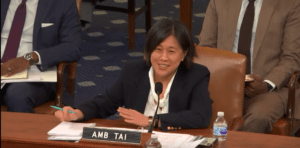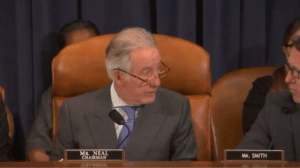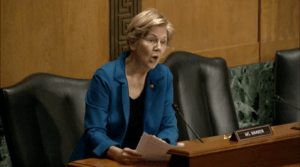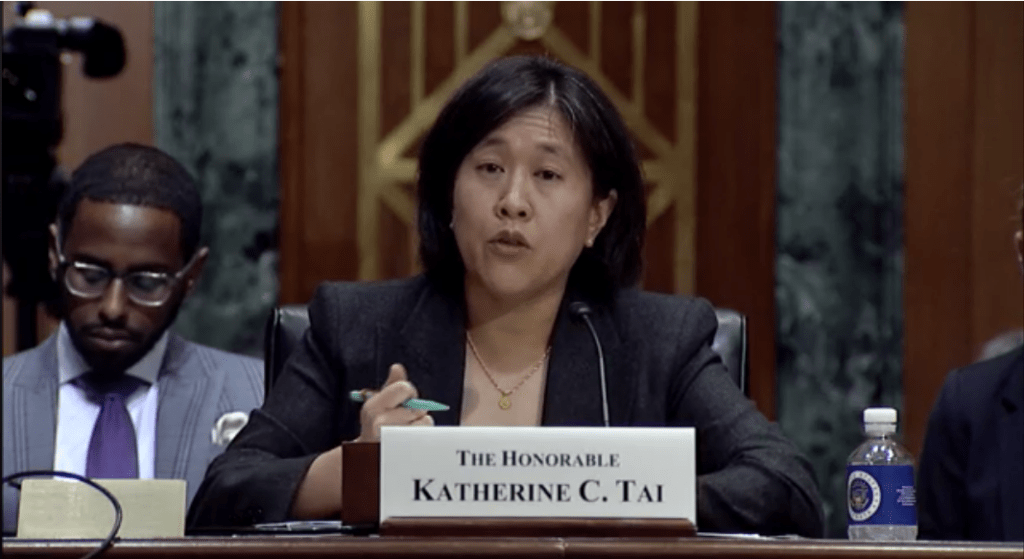It sounded like the 1980s in Congress this week. Free trade and open markets were all the rage in a Senate Finance Committee hearing and a House Ways and Means Committee hearing with America’s top trade diplomat, Katherine Tai.
In both hearings, USTR Tai heard from members of Congress that suggested a concern over the Biden administration’s lackluster interest in free trade deals. Market access for U.S. goods also came up, with Tai often forced to play defense in both chambers of Congress.
Some of the criticism came from Senators representing agricultural goods exporters. They were the most forceful pro-free traders during Thursday’s Finance Committee hearing. Their animosity towards Trump-era trade war tariffs was palpable.
Senator Maria Cantwell (D-WA): “We are not hearing that getting rid of tariffs is a priority. That is what people in my state want to hear. When you look at commodities, that is more than 70% of our exports from Washington. I don’t agree that tariffs like we did on solar, are the path forward.”
Then, along with reminding Tai that she controlled some USTR purse strings, Cantwell talked about supporting manufacturing capacity building in Mexico.
“I got USTR a bunch of money so you could hire more lawyers and do enforcement. I led the charge to do more capacity building in Mexico so we can enforce trade agreements,” she said. “l say that because I agree that trade is good. This isn’t some past thing we aren’t going to do anymore. I’m for enforcement. I’m for capacity building. We need to get rid of tariffs and increase tariff exclusions.”
Senator Mike Crapo (R-ID), the ranking member of the Senate Finance Committee chaired by Ron Wyden (D-OR) asked Tai about market access in Mexico for Idaho potatoes, and in one moment that showed the character of Tai trying to calm the room, she said, half smiling, “Um, Senator Crapo, let me address that issue to you in respect to Idaho potatoes. You know how much I love potatoes.”
Regarding that particular market access for agriculture in the new USMCA, Tai said it has been a few steps forward and a few steps backward, “but all options are on the table, and we are trying to secure a win here.”
Crapo brought up the Indo-Pacific Economic Framework (IPEF), another shot at the Trans-Pacific Partnership (TPP) only in a different name. He questioned why the USTR and the Biden administration were not making market access a priority in those discussions.
Katherine Tai: “Market access is not really on the table in IPEF. For me, market access in trade talks means tariff liberalization and that is true we are not talking about that and that is because our traditional trade models and our traditional FTAs have led us to a place where we are facing a considerable backlash that we are hearing from our own people about offshoring and outsourcing of American jobs and opportunities through these types of arrangements.”
Sen Crapo: “Well, I define market access as free trade agreements. We got nations in the Indo Pacific crying out for these relations so they can strengthen their relations with us rather than being tied to China.”
There was more “work with allies” talk from the Committee, as well.
Sen. John Barrasso (R-WY): “China understands market access and understands securing market share…so what is the solution to that in IPEF if market access isn’t a top issue? It is not clear to me how the framework will even help us counter China. We need to work with our allies and lower trade barriers. The Biden trade agenda falls way short of that.”
Tai: “I’m disappointed to hear that you think we haven’t been doing anything (on market access) because my commitment to our economy, our trade policy…is absolute.”
Senator Barrasso then said that the U.S. was losing market share.
“I don’t think we have lost market share, at all,” said Tai. She countered Senators who brought the Asian Regional Comprehensive Economic Partnership, or RCEP. That agreement is mostly between countries that already have significant trade agreements between them. RCEP is often used by free traders in Washington to sell more free trade deals in Asia, as if such arrangements would somehow stop China from being enmeshed in American supply chains. Tai pushed back on this talk about the Biden administration not opening up markets for U.S. goods, and noted agreements with Japan on beef, and agreements with the U.K. and European Union on steel quotas.
“I want to stick up for myself in terms of all the work we have done,” Tai said. “That work does include market opening.”
 House Ways & Means: More Free Trade?
House Ways & Means: More Free Trade?
On Wednesday, House Ways & Means Committee Chairman Richard E. Neal (D-MA) started off talking about Tai’s accomplishments, including the Airbus/Boeing resolution after a years-long trade dispute. But like his counterparts in the Senate, who would speak to Tai 24 hours later, he, too, was all about opening markets via new trade deals.
Chairman Richard E. Neal: “I am looking forward to new trade arrangements with like-minded countries. I am especially interested in deepening trade ties with European and African countries. The events in Ukraine remind us of the need to forge closer economic ties with Europe.”
This is a line of thinking similar to what became a talking point in the Trump administration, the idea that the U.S. should mostly forge supply chain interdependencies with a group of democratic countries.
It is worth noting that the U.S. already has deep trade ties with Europe, particularly in the main commercial areas of pharmaceutical and automotive. The U.S.’s second biggest trade deficit after China is with the European Union.
Regarding supply chain resiliency in light of the ongoing war in Ukraine, Chairman Neal said that a “new U.S. European trade agreement would only enhance our ability to moderate Russian aggression.”
Although he did not mention China, Neal said the U.S. must strengthen its ties to Africa – a continent where China has strong ties in the natural resources industry, finance and in 5G telecom — and talked about an upcoming Congressional mission to Kenya. He said that he spoke with Kenyan leaders two years ago and that their leaders had “shown willingness to embark on a free trade agreement. We should do it.”
Rep. Adrian Smith (R-NE) noted that supply chain resiliency came to the fore because of the pandemic, and then again during new economic sanctions against Russia.
“This has shown that the American economy needs to step up domestic capacity, and we have to work with our allies to ensure reliable supply,” he said.
Smith also said Tai had to be tougher on China now that it has failed to live up to its phase one trade purchase agreements. “China’s distorted trade policies that hurt U.S. workers. And yet there no plan in the White House to hold China accountable for not living up to its agreement,” he said.
But while getting tough on China was an easy topic, more trade deals still won the day in the House.
Rep. Vern Buchanan (R-FL): “I feel like we had such good momentum coming off USMCA. Will your office commit to improving communication with businesses that still have applications pending for Section 301 exclusions?”
USTR just removed hundreds of tariffs from companies whose exclusion requests expired last year. It seems Buchanan was not aware of this. Tai should have reminded him of it. She did not.
Very few pounded the table in favor of domestic supply chains and manufacturing.
One standout was Rep. Mike Kelly (R-PA). He gave the other take on market access and the days focus on going abroad.
“When we talk about market access, think about how much we lost market share in our own country because of foreign competition,” he said, adding the U.S. has suffered massive job loss due to the focus on foreign trade and offshoring. He called it a national security issue.
Rep. Mike Kelly: “You talk about infrastructure and our energy grid, and a lot of the things we need for that we have allowed to go overseas because it will be cheaper to make it there. But it will not be cheaper when you think of the loss of market share. We have a clear and present danger right now because we keep losing our own home market share. All of us represent about a quarter-million people and we have to care about them. We have lost so much over the years. We keep talking about making things fair. We make it fair; then they take market share. Trade agreements are okay, but then you have a problem and you complain to the WTO and you wait 10 years and by then its game over. When you’re working on trade you have to be the toughest cat in the room, because people love taking advantage of us.”
Back in the Senate, it was Elizabeth Warren who threw her own signature bucket of cold water on IPEF.
 Sen. Elizabeth Warren (D-MA): “Lobbyists for the giant corporations are celebrating the IPEF as the second coming of the TPP. There’s a reason the original TPP was derailed. It would have offshored more jobs to countries that use child labor and prison labor and pay workers almost nothing. The IPEF is not going to be TPP 2.0.”
Sen. Elizabeth Warren (D-MA): “Lobbyists for the giant corporations are celebrating the IPEF as the second coming of the TPP. There’s a reason the original TPP was derailed. It would have offshored more jobs to countries that use child labor and prison labor and pay workers almost nothing. The IPEF is not going to be TPP 2.0.”
Tai and Commerce Secretary Gina Raimondo will lead a number of the IPEF discussions, with Tai leading on labor issues and environmental regulations.
“One of the areas where the U.S. has led around the world has been on strong labor and on environmental standards,” Tai said. “We have to keep our commitment to these areas because it relates to our competitiveness.”
Senator Warren gave an impromptu executive summary of the International Trade Commissions report last summer on how big trade deals impact American manufacturing and the labor market.
“Our trade deals have for years been for and about large corporations who benefit from lower standards abroad,” Warren said. “Let’s raise standards so maybe these companies will build here and bring jobs home.”













